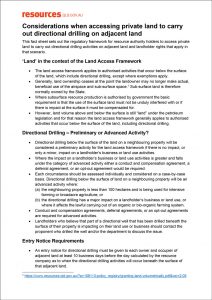Department of Resources ‘Directional Drilling’ fact sheet
Recently a number of Dalby district landholders raised concerns to the GasFields Commission (the Commission) and the State Government about the processes and potential impacts of directional drilling activities under landholders’ properties.
 The Commission proactively raised these concerns with agricultural and resource sector peak bodies and the Department of Resources.
The Commission proactively raised these concerns with agricultural and resource sector peak bodies and the Department of Resources.
In response to these concerns and to clarify the existing regulatory framework, the Department of Resources has released a ‘Directional Drilling’ fact sheet that sets out the regulatory requirements for resource authority holders to access private land to carry out directional drilling activities on adjacent land, and the landholder rights that would apply in that scenario.
Importantly, the fact sheet outlines clear expectations of authority holders to engage early and openly with landholders around resource activities, whilst seeking to understand the impacts these directional drilling activities may have on landholders’ businesses.
Who are the GasFields Commission Queensland?
Established as an independent statutory body in 2013, the Commission’s purpose is to manage and improve the sustainable coexistence of landholders, regional communities and the onshore gas industry in Queensland. The Commission manages sustainable coexistence in petroleum and gas producing regions of Queensland, and will continue to do so as the industry expands into new and emerging basins.
Our vision is to achieve thriving communities in areas of gas development that are free from discord and supported by well-informed, respectful and balanced stakeholder relationships.
One way the Commission is endeavouring to realise this vision is by providing transparency and independent assurances that the onshore gas industry is appropriately regulated and held to account when needed. This in turn will help cultivate sustainable coexistence, whilst ensuring community and landholder confidence in the regulators and gas industry increases.
Drawing on its wealth of experience in the development of the gas industry and by collaborating with other relevant entities, the Commission provides a range of support to communities and landholders, primarily through education and engagement. These education and engagement activities occur with individual landholders via Commission facilitated webinars, information sessions, publications (The Gas Guide, Shared Landscapes Reports), face-to-face meetings and public workshops.
It should be noted that the Commission does not engage in individual negotiations between landholders and gas companies, but rather provides communities and landholders with the information and support they need to make informed decisions and achieve good outcomes.
![]()
![]()
![]()
![]()
![]()

